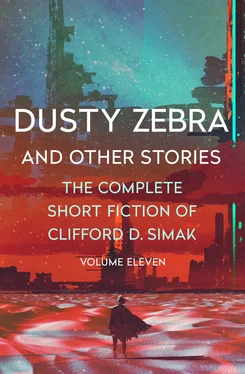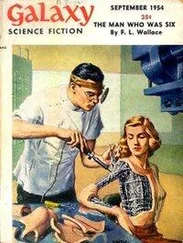It was precisely the kind of thing, he thought, one could expect of White.
He could not imagine how it had been done—but if there had been a way to do it, White would have been the one to ferret out that way.
He’d engineered it so that Enright, by reading a line out of a book, had stayed in public life until the proper time had come for him to head the state department.
And how many other men, how many other situations, stood as they did tonight because of the vast schemings of one Preston White?
He saw the paper on the floor and picked it up and looked at the headline, then threw it down again.
They had tried to get rid of him, he thought, and it would have been all right if he’d just wandered off like an old horse turned out to pasture, abandoned and forgotten. Perhaps all the others had done exactly that. But in getting rid of him, in getting rid of anyone, they must have been aware of a certain danger. The only safe and foolproof way would have been to keep him on, to let him go on living as the final gentleman until his dying day.
Why had they not done that? Was it possible, for example, that there were limitations on the project, that the operation, whatever its purpose, had a load capacity that was now crammed to its very limit? So that, before they could take on someone else, they must get rid of him?
If that were true, it very well could be there was a spot here where they were vulnerable.
And yet another thing, a vague remembrance from that congressional hearing of some years ago—a sentence and a picture carried in the papers at the time. The picture of a very puzzled man, one of the top technicians who had assembled Harvey, sitting in the witness chair and saying: “But, senator, I tell you no analytical computer can be anywhere near as good as they claim Harvey is.”
And it might mean something and it might not, Harrington told himself, but it was something to remember, it was a hope to which to cling.
Most astonishing, he thought placidly, how a mere machine could take the place of thinking man. He had commented on that before, with some asperity, in one of his books—he could not recall which one. As Cedric Madison had said this very evening…
He caught himself in time.
In some dim corner of his brain an alarm was ringing, and he dived for the folded paper he had tossed onto the floor.
He found it, and the headline screamed at him and the books lost their calf-bound elegance and the carpeting regained its harsh newness, and he was himself once more.
He knelt, sobbing, on the floor, the paper clutched in a shaky hand.
No change, he thought, no warning!
And a crumpled paper the only shield he had.
But a powerful shield, he thought.
Try it again! he screamed at Harvey. Go ahead and try!
Harvey didn’t try.
It had been Harvey. And, he told himself, of course he didn’t know.
Defenseless, he thought, except for a folded paper with a headline set in 18 point caps.
Defenseless, with a story that no one would believe even if he told it to them.
Defenseless, with thirty years of eccentricity to make his every act suspect.
He searched his mind for help and there was no help. The police would not believe him and he had few friends to help, for in thirty years he had made few friends.
There was the senator—but the senator had troubles of his own.
And there was something else—there was a certain weapon that could be used against him. Harvey only had to wait until he went to sleep. For if he went to sleep, there was no doubt he’d wake the final gentleman and more than likely then remain the final gentleman, even more firmly the final gentleman than he’d ever been before. For if they got him now, they’d never let him go.
He wondered, somewhat vaguely, why he should fight against it so. The last thirty years had not been so bad; the way they had been passed would not be a bad way, he admitted, being honest with himself, to live out the years that he had left in him.
But the thought revolted him as an insult to his very humanness. He had a right to be himself, perhaps even an obligation to remain himself, and he felt a deep-banked anger at the arrogance that would make him someone else.
The issue was straightly drawn, he knew. Two facts were crystal clear: Whatever he did, he must do himself; he must expect no help. And he must do it now before he needed sleep.
He clambered to his feet, with the paper in his hand, squared his shoulders and turned toward the door. But at the door he halted, for a sudden, terrible truth had occurred to him.
Once he left the house and went out into the darkness, he would be without his shield. In the darkness the paper would be worthless since he would not be able to read the headline.
He glanced at his watch and it was just after three. There were still three hours of darkness and he couldn’t wait three hours.
He needed time, he thought. He must somehow buy some time. Within the next few hours he must in some way manage to smash or disable Harvey. And while that, he admitted to himself, might not be the whole answer, it would give him time.
He stood beside the door and the thought came to him that he might be wrong—that it might not be Harvey or Madison or White. He had put it all together in his mind and now he’d managed to convince himself. He might, he realized, have hypnotized himself almost as effectively as Harvey or someone else had hypnotized him thirty years ago.
Although probably it had not been hypnotism.
But whatever it might be, he realized, it was a bootless thing to try to thresh out now. There were more immediate problems that badly needed solving.
First of all he must devise some other sort of shield. Defenseless, he’d never reach the door of the Situation lobby.
Association, he thought—some sort of association—some way of reminding himself of who and what he was. Like a string around his finger, like a jingle in his brain.
The study door came open and old Adams stood there, clutching his ragged robe together.
“I heard someone talking, sir.”
“It was I,” said Harrington. “On the telephone.”
“I thought, perhaps,” said Adams, “someone had dropped in. Although it’s an unearthly time of night for anyone to call.”
Harrington stood silent, looking at old Adams, and he felt some of his grimness leave him—for Adams was the same. Adams had not changed. He was the only thing of truth in the entire pattern.
“If you will pardon me,” said Adams, “your shirt tail’s hanging out.”
“Thanks,” said Harrington. “I hadn’t noticed. Thanks for telling me.”
“Perhaps you had better get on to bed, sir. It is rather late.”
“I will,” said Harrington, “in just another minute.”
He listened to the shuffling of old Adams’ slippers going down the hall and began tucking in his shirt tail.
And suddenly it struck him: Shirt tails—they’d be better than a string!
For anyone would wonder, even the final gentleman would wonder, why his shirt tails had a knot in them.
He stuffed the paper in his jacket pocket and tugged the shirt tails entirely free. He had to loosen several buttons before there was cloth enough to make a satisfactory knot.
He made it good and hard, a square knot so it wouldn’t slip, and tight enough so that it would have to be untied before he took off the shirt.
And he composed a silly line that went with the knotted shirt tails:
I tie this knot because I’m not the final gentleman.
He went out of the house and down the steps and around the house to the shack where the garden tools were kept.
He lighted matches until he found the maul that he was looking for. With it in his hand, he went back to the car.
Читать дальше












